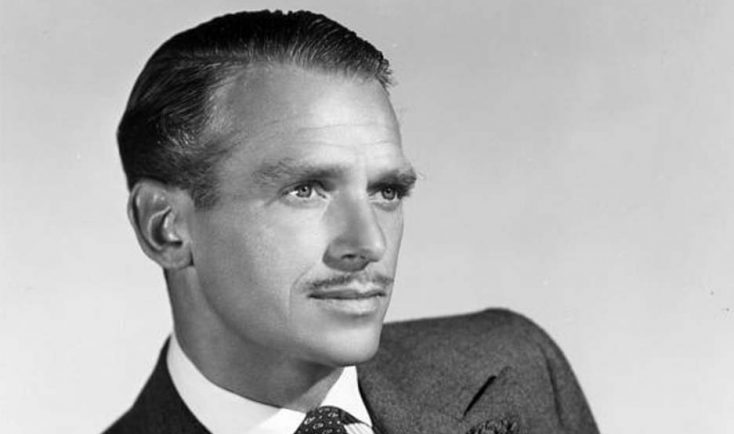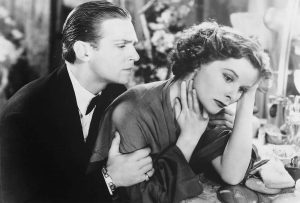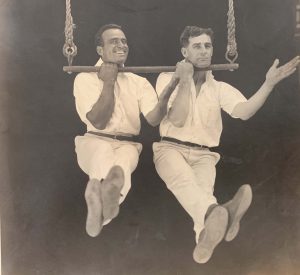By JUDY SLOANE
Front Row Features
HOLLYWOOD-Douglas Fairbanks Jr. was a successful actor, producer and an honored naval officer in World War II. The son of silent movies’ most dashing swashbuckler, Douglas Fairbanks, he carved out an extremely successful career of his own with such classic motion pictures as “Dawn Patrol,” “Little Caesar,” “Morning Glory,” “Gunga Din” and “The Prisoner of Zenda.” Fairbanks passed away on May 7, 2000 at the age of 90. I was lucky enough to speak with him in 1994 about his life and career and the difficulties of carrying on the Fairbanks’ name.
Judy Sloane: In your long and successful career you certainly made the name Fairbanks your own, but when you were starting out was it a hindrance to you to be named after your father?
Douglas Fairbanks Jr.: I think it probably was. It was a mixture of both in a way. It was useful in having the door open to get interviews, and to be allowed in to talk to the boss, but that was more of a courtesy. And it didn’t make the jobs any easier, in fact it probably made them harder, because they expected more than I was able to deliver at a young age.
Judy Sloane: Were you and your father close?
Douglas Fairbanks Jr.: Not at first. We were just shy of each other. As my family had separated, my mother and father divorced when I was about 8 or 9, I would only see him on occasion. I think we were always fond of each other, but we didn’t quite know how to show it. It wasn’t until I was in my late twenties that we got to know each other very well. For the first time we rediscovered each other, and then we were almost like contemporaries, in the sense that he would come to me for advice instead of my going to him. So in his last few years we were very close.
Judy Sloane: What was your relationship like with your stepmother Mary Pickford?
Douglas Fairbanks Jr.: I was devoted to her, and she was always wonderful with me. Our relationship was helped by the fact that my mother, instead of being bitter at the divorce, was most understanding and encouraged me to be as close to Mary as possible, and I used to visit her as much as I could. In her last few months of life I’d sit by her bedside for an hour or two. I never thought of her as a conventional stepmother, she was just a lovely, charming lady.
Judy Sloane: What are your memories of their famous home, Pickfair?
Douglas Fairbanks Jr.: They’re fairly vivid. It wasn’t anything as glamorous as the press made out. People made out that it was like a palace, and it wasn’t. It was just a nice country house on top of a hill, with a lot of gardens and a lot of land around it. It had about16 or 18 acres I think originally, maybe more. It’s now down to about one or two acres. The original house has been torn down and rebuilt.
Judy Sloane: Was your father a big influence in your life?
Douglas Fairbanks Jr.: Not really, except I certainly took notice of his wonderful good nature with people. He was always very nice to everybody he talked to, and he didn’t have to put it on. It was a natural friendliness, and that I admired and I probably wanted to give that same impression when I was young.
Judy Sloane: Out of all your father’s films, do you have a favorite one?
Douglas Fairbanks Jr.: I think my very favorite one is “The Thief of Baghdad.” I think that was one of the finest motion pictures ever made by anyone. I think it’s a classic in the sense that it is one that takes the most advantage of film as a motion picture medium, as a rival to painting and sculpture. I think it’s a great work of art, and although a lot of people are credited with having a hand in it, everybody did more or less as my father wanted. He was the guide and the creator. Everything was his idea and done according to his plan, and therefore it is pretty much his creation, as was “Robin Hood,” and “The Three Musketeers.”
Judy Sloane: Being brought up in a show business family did you want to be an actor?
Douglas Fairbanks Jr.: It wasn’t a show business family. Only my father was in the business, and it wasn’t brought home. I wasn’t aware of it. I couldn’t help but be aware of it to certain extent, because people would come around and talk about it, but I think the only one that I remember coming around the house when my mother and father were still together was Charlie Chaplin, and the talk was very seldom shop-talk.
Note: In part-two of my interview with Douglas Fairbanks Jr. we discussed his movies, including “Gunga Din,” in 1939 with Cary Grant, and his role as the villainous Rupert of Hentzau in “The Prisoner of Zenda,” in 1937 co-starring Ronald Colman.
My grandfather, Fred Stone, was a good friend of Douglas’ father – here’s a publicity photo of them – l to r, Douglas Fairbanks, Fred Stone
Portions of this article were first published in Film Review







